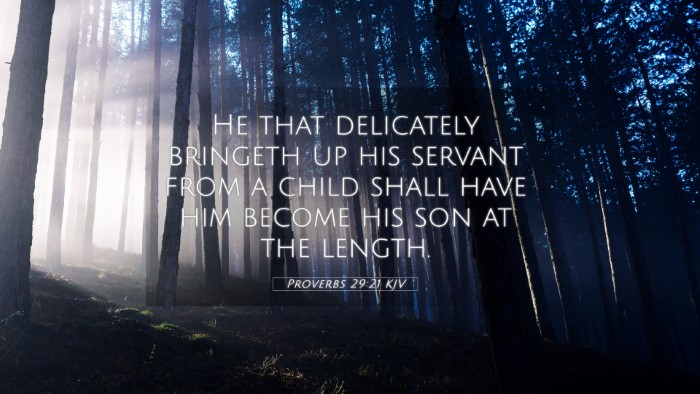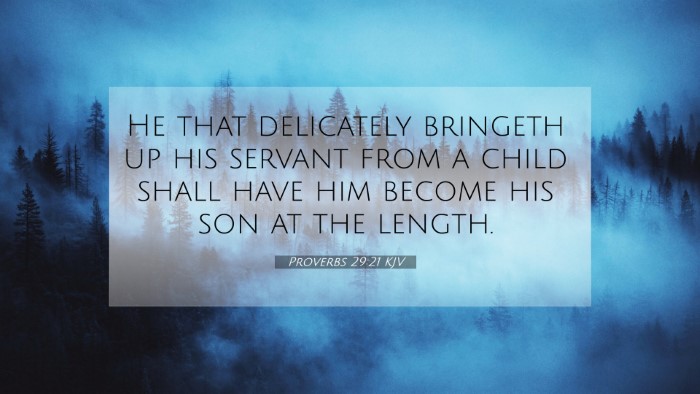Understanding Proverbs 29:21
Proverbs 29:21 provides valuable insights into the dynamics of discipline and affection in parenting. It states:
"He that delicately bringeth up his servant from a child shall have him become his son at the length."
Summary of Biblical Meaning
This verse emphasizes the importance of how affection and care influence relationships, particularly in the context of parenting and guidance. The central theme is that an overly indulgent approach may lead to adverse outcomes in character and integrity.
Insights from Public Domain Commentaries
-
Matthew Henry:
Henry reflects on the dangers of pampering children or servants. He argues that while nurturing, it is crucial to balance affection with moral training to avoid fostering laziness or entitlement.
-
Albert Barnes:
Barnes interprets this verse to suggest that raising someone without proper discipline could lead to them developing weak character traits. He encourages the necessity of discipline as a foundation for genuine affection.
-
Adam Clarke:
Clarke elaborates on the socio-cultural context of the verse and illustrates how those in authority must instill not just love but also respect and responsibility in their charges.
Bible Verse Cross-References
- Proverbs 13:24: "He who spares the rod hates his son, but he who loves him is careful to discipline him." - This emphasizes the need for discipline paired with love.
- Ephesians 6:4: "Fathers, do not provoke your children to anger, but bring them up in the training and instruction of the Lord." - Highlights the responsible raising of children with a focus on God’s teachings.
- Hebrews 12:11: "No discipline seems pleasant at the time, but painful. Later on, however, it produces a harvest of righteousness and peace for those who have been trained by it." - Reinforces the long-term benefits of discipline.
- Proverbs 19:18: "Discipline your children, for in that there is hope; do not be a willing party to their death." - Calls attention to the hope nurtured through discipline.
- Colossians 3:21: "Fathers, do not embitter your children, or they will become discouraged." - Balances the need for discipline with the emotional health of children.
- Proverbs 22:6: "Train up a child in the way he should go; even when he is old he will not depart from it." - Suggests that initial guidance shapes future actions.
- 1 Timothy 3:4-5: "He must manage his own household well, with all dignity keeping his children submissive, for if someone does not know how to manage his own household, how will he care for God’s church?" - Discusses authority and management in the context of family and leadership.
Connections Between Bible Verses
This verse can be connected to a broader theme within scripture concerning responsible leadership and nurturing. It speaks to the inter-Biblical dialogue around parenthood and mentorship, suggesting that the way one raises their dependents will indeed shape their future.
Thematic Bible Verse Connections
In exploring the overarching themes found in Proverbs 29:21, it is apparent that love cannot stand alone without proper guidance. Affection must be paired with discipline consistent with spiritual teachings.
Comparative Bible Verse Analysis
When conducting a comparative study, notice how different verses address the nuances of child-rearing through different lenses. For example, the duality of love and discipline can be witnessed in both Proverbs and the New Testament letters, making a compelling case for the theme of balanced upbringing.
Tools for Bible Cross-Referencing
Utilizing bible concordance and bible cross-reference guides can enrich one’s understanding of Proverbs 29:21 by revealing interconnections with various scriptures. Engaging in cross-reference Bible study allows for a deeper grasp of biblical teachings.
Conclusion
In conclusion, Proverbs 29:21 speaks volumes about the nature of influence, care, and responsibility in relationships, particularly concerning guidance and upbringing. Understanding this verse through the lens of cross-references can lead us to a richer participation in scriptural truths and real-life applications.


